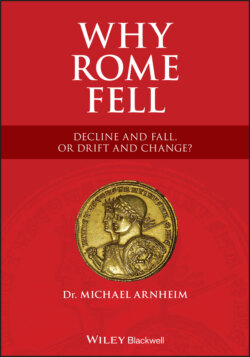Читать книгу Why Rome Fell - Michael Arnheim - Страница 52
Envoi: Augustus v. Alexander
Оглавлениеἀκούσας δὲ ὅτι Ἀλέξανδρος δύο καὶ τριάκοντα γεγονὼς ἔτη κατεστραμμένος τὰ πλεῖστα διηπόρει τί ποιήσει τὸν λοιπὸν χρόνον, ἐθαύμαζεν εἰ μὴ μεῖζον Ἀλέξανδρος ἔργον ἡγεῖτο τοῦ κτήσασθαι τὴν ἡγεμονίαν τὸ διατάξαι τὴν ὑπάρχουσαν. [p. 234]
“Hearing that, after accomplishing most of his conquests by the age of thirty-two, Alexander was at a loss what to do for the rest of his life, Augustus expressed surprise that Alexander did not regard it as a greater achievement to stabilize the empire which he had won than to win it.” (Plutarch, Regum et imperatorum apothegmata, Frank Cole Babbitt, 1931, p. 235, translated by M. Arnheim.)
The above passage comes from a collection of aphorisms or sayings of a variety of kings and emperors published by the prolific Greek biographer and essayist, Plutarch, probably in around 100, or about a century after the time of Augustus.
A neat contrast is drawn here between Alexander the Great (356–323 BCE), a military man obsessed with conquest, and Augustus, portrayed as a statesmanlike ruler, administrator and planner. Whether Augustus ever did comment on Alexander in this way is open to doubt. But, as they say in Italian, Se non è vero, è ben trovato (If it’s not true, it’s at least plausible). The contrast between the two men is certainly striking. By the age of 32, Alexander had conquered most of the known world, but he showed no interest in organizing his empire, and on his death soon after, it was split up among his generals. At 32, Augustus (63 BCE–14 CE) had just emerged as the victor of Actium and was about to embark on one of the most ambitious and enduring governmental or administrative feats ever achieved anywhere.
Nobody has ever accused Alexander of being a democrat (as far as I know, not yet, anyway!), and it is significant that, in Plutarch’s probably fictitious little vignette, Augustus speaks as a ruler in complete control of his empire. There is none of the propagandistic double-talk that we find in his masterly autobiography discussed above. Yet, it is to his acumen and thoroughgoing, unblinking analytical understanding of the true countervailing forces at work in the power structure of his dominions that his success is attributable, making him perhaps the most effective ruler of all time, who was able not only to consolidate a stable regime for his own lifetime across the whole Mediterranean basin, but also to guarantee its survival for another 300 years.
